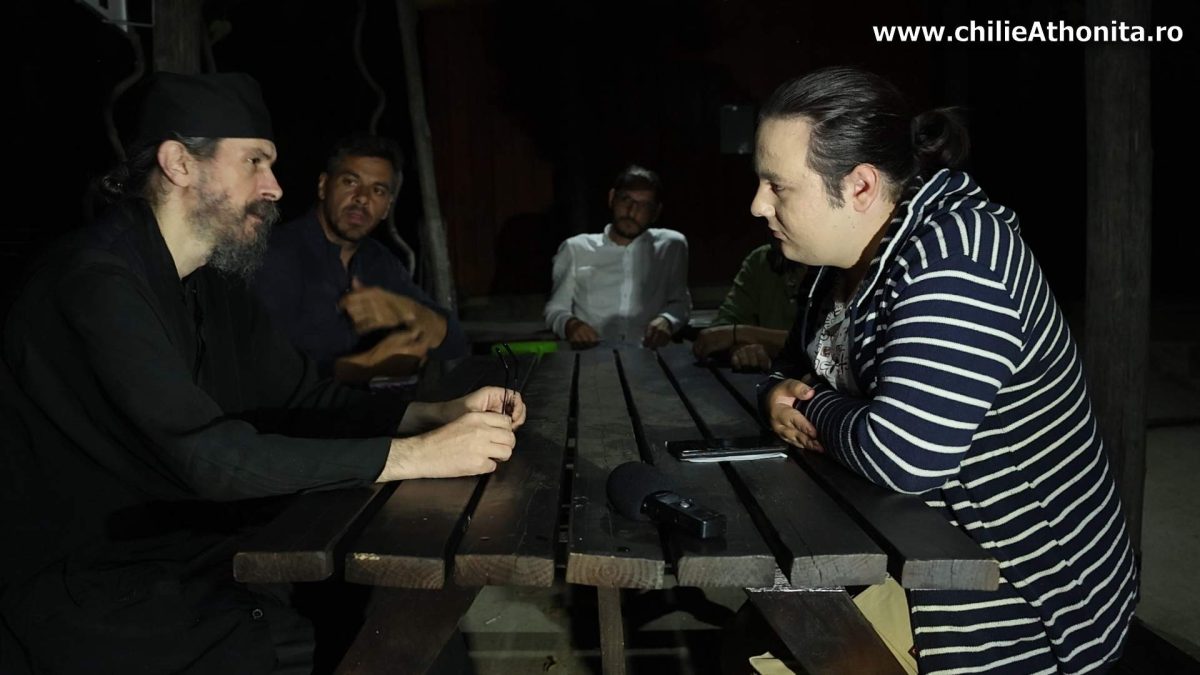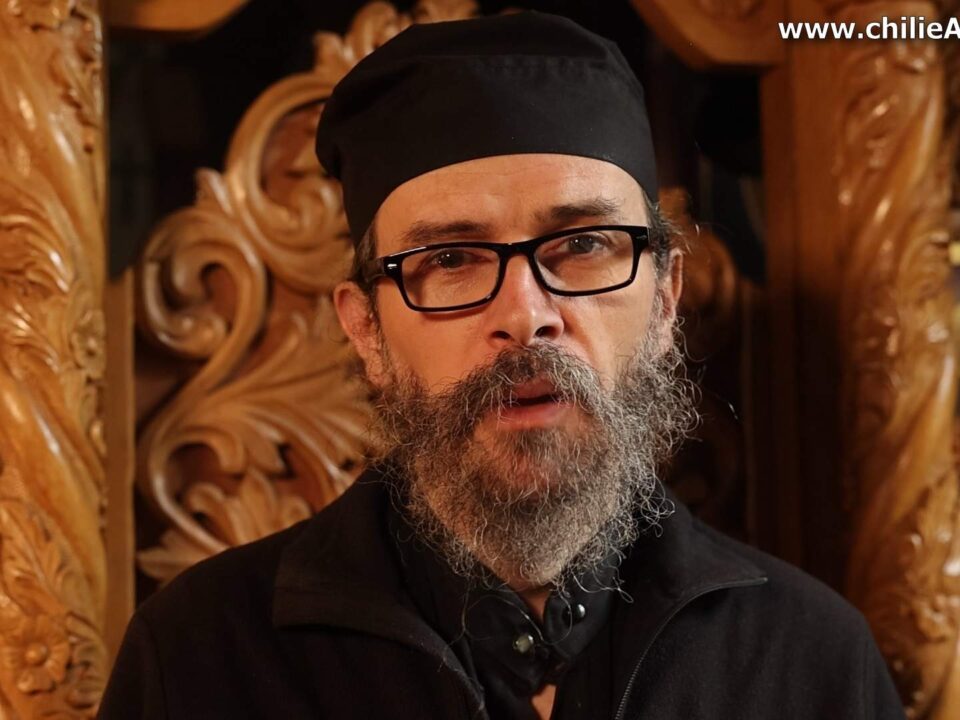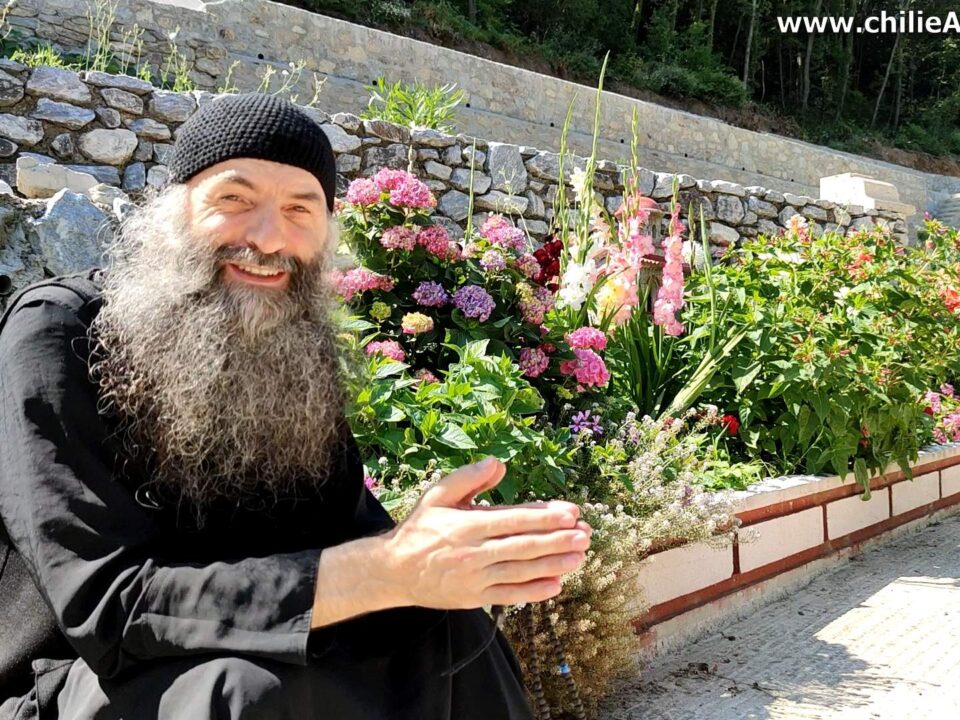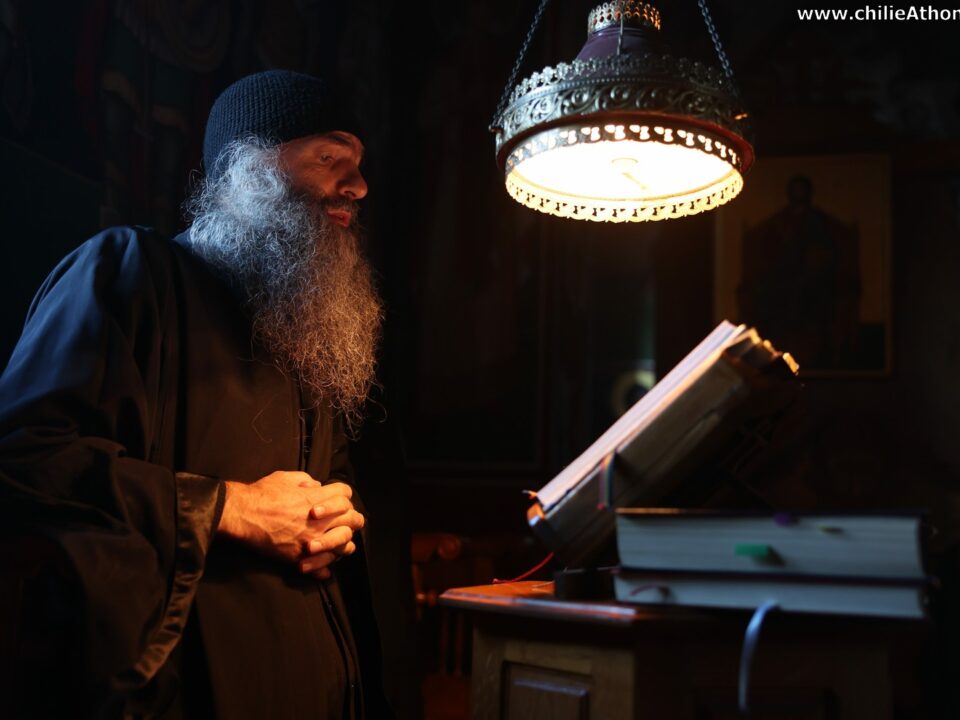
The Remembrance of Death and Repentance – Father Pimen Vlad
9 September 2022
Suicide Does Not Solve Anything – Father Theologos
13 September 2022Watch an interview with George Savu Pascal from Radio Trinitas in which a discussion is started on the problems of Orthodox youth today, seen especially from the perspective of young people.
What is pressing young people today and what can we do about it?
Enjoy!
Glory to the Father, and to the Son, and to the Holy Spirit, now and forever and unto the ages of ages. Amen. Through the prayers of our Holy Fathers, Lord Jesus Christ, Son of God, have mercy on us! Amen.
We are with George with whom I just did a podcast for Radio Trinitas and now as I told him and as I usually do, I will also ask him some questions, that is, he will “pay” me. With love, of course, because as I said, everyone has a certain experience that needs to be shared with others. Every person is someone who is unique and unrepeatable and it is so beautiful that heaven, you must know, will be the unity between us, it will be the sharing of experiences.
George works on the show “Youth for Youth”, right?
George: Volunteer at “Youth for Youth”.
Father Theologos: Volunteer at “Youth for Youth”. Okay, tell us something from your experience! What are the problems of young people today?
George: Young people today… I think the biggest problem is that they can’t find a balance between spiritual life and everyday life. The hardest thing for us is to find ourselves in modern collectives or school collectives, to find ourselves and feel at ease.
Father Theologos: Yes… Why do you think that is? Why do you think this is happening?
George: I think there was, or still is, a pretty big wave of discrimination and there’s a shame, let’s call it. Not necessarily a shame, like an embarrassment and a fear of being…
Father Theologos: To be ostracized, to be pushed to the margins of society. That’s actually a lack of love. And in fact, all these problems arise because of this lack of a Christian society. And these things, you see, did not exist earlier when there were no non-Christian influences, or rather, so to speak, heretical influences outside the focus of love that is called Orthodoxy.
How do you see this being resolved?
George: It would be good to know exactly a few solutions. I don’t know. I think we should familiarize more people with these ideas.
Father Theologos: And through the radio you work on, do you think you could acquaint others with the spiritual life?
George: Yes. We are trying that and we want to bring as many young people as possible, listeners in the first phase of Radio Trinitas and can this be a first step in finding out the true faith and starting a spiritual life.
Father Theologos: Yes, because without spiritual life, indeed, young people need to know that they have a continuous fear. If, as I said in your podcast, if a young person does not have faith in Christ, they will be constantly in fear, in uncertainty.
Orthodoxy is not… to appear good to the world, how can I say, as a social norm that must be fulfilled in Romania or the good Lord knows in other countries, but it is overcoming fear, overcoming insecurity. It is this leap of faith through which I step out of the very narrow frames of my own vision. From the very narrow frameworks of one’s own logic. What happens if this, what happens if that, and so on.
And then, if I believe and if I do what God says, which somehow… Well, there is no other word, they are called commandments, if I do these commandments, that is, this healing therapy of the human soul, I will have security. My result will be security, faith – as St. Maximus the Confessor says, a faith above all logic stronger than any scientific assurance.
I mean, people should be content that, yes, God takes care of them. They will have temptations, they will feel turmoil, but behind these disturbances they will have the peace of Christ, the peace of God. And this is what informs others, what gives others the assurance that yes, this is the way! This It is very important. And that’s where we all need to get to. So that’s what needs to be done.
Well, the biggest problems of young people so, concretely, what is the relationship of young people with… What shall I say now, with music? After that, we’ll go to the topic of social networks. Or with art, with art. I should get informed myself now. I’m not asking you trick questions, but I want to find out.
George: You asked me about music. I think it’s a bit harder to find out from my side, because I’ve been doing music for a very long time, since I was 6 years old I’ve been singing and discovering other musical genres, I got to listen… More jazz, more romantic influences, so to speak.
Father Theologos: Ok…
George: Instead, I think the mass of our generation doesn’t listen to very orthodox music.
Father Theologos: Yes… And what did I mean, if you felt pushed away or certain other problems if you listen to unfashionable music?
George: Yes, I mean, again, I don’t show up listening to jazz or other genres either. First of all, I also noticed a change in mood. I mean, a lot of people say music doesn’t influence things. It influences me a lot and rather than listening, I don’t know…, let’s say rather than listening to rock which always makes me agitated, I better listen to jazz, chamber music and I can even have a connection with God.
Father Theologos: Yes. Music influences enormously and because of this young people listen to music and are very dependent on music because through music they seek heaven. All men seek heaven. The search for heaven is in man’s spiritual DNA. The whole planet is looking for heaven, you know. It’s just that most of us search where we heaven isn’t and search the wrong way. Do you understand?
And music being one of, so to speak, traces of God on earth, the most poignant, art, yes, music, that’s why people are very, very dependent on music, they look very much in that direction and as you can see in… I don’t know if you know, in the Church, music is very well developed and the singer is held in high esteem and from here, of course, [there are] certain temptations for the singers, I pray and so on.
But I want to say that even in the Church and even the Holy Fathers spoke about music as something very important. Music and image. For image was made, even for music somewhat, an entire ecumenical council, the 7th ecumenical council was made for image, and the dogmatic basis of the 7th ecumenical council was St. John Damascene who is the composer par excellence. The one who systematized the 8 voices and so on. So I want to say that art is very, very important in people’s lives and that’s why I asked you about music, in young people and in a way I’m pleasantly surprised on this topic that you listen to more music… Although I, as a monk, do not listen to this, but brethren, you cannot imagine what could happen.
Now I confess publicly what happened to me, a temptation… temptation, what can I say… Someone wrote to me, I don’t remember who, in any case I had to answer this – what do you think of so-and-so? I don’t remember his name. And I see the name, I didn’t know who she was, I look on Wikipedia and I really see that she’s a singer of 25 years, famous, with millions and millions of records sold, awards, clearly superstar. Ok…
Well, come on, let’s listen [to her] so that I can give a knowledgeable answer. Speaking of music, you have to know that – well, now I’m a monk and it’s different, but before I listened to a lot of music and you have to know that I wanted to understand people. I mean, I didn’t want to be hated by anybody and so I listened to everything from opera music, chamber music to death metal, trash-metal. Of course I had some potholes, I mean, I didn’t like certain things, but okay, if I refuse something I want to knowingly refuse, it doesn’t mean I liked all of them.
And so I was very open to music. Well, brethren, when I heard this 25-year-old lady, superstar and so forth, she didn’t have any kind of melodic line. So nothing. Tac-tac-tac-tac-tac, something like that, a constant declamation. But it wasn’t just that, brethren. It was that… I think the most obscene language of my life that I’ve ever heard – now I confess and publicly…
If my father heard me, God bless him, that when I was young I heard things like that, I think… Not that he’d slap me, but it wouldn’t have been far from that. Such a language, God forbid! So explicit, so dirty… Mother of God! And that’s on YouTube, brethren. I mean, God forbid!
I don’t go to websites… Mother of God!
And what horrified and terrified me – this woman, at 25, had 825 million views. Brethren, Europe has 40-something million people. So this little girl, woman that you could see by the lyrics what experiences she had, God forbid! And of course it was also the other way around, as Romanian people say, so… There are two Europes. So the video had as many views as twenty Europes and not only that, I don’t know how many tens of thousands of likes and of course, comments – “masterpiece, masterpiece” and all that.
And I was sitting and watching, I say, what a culture, what an anti-culture, so it didn’t express anything about it, so it was actually a string of swearing, like in the worst places. And what was again a shock for me and was the fact that, I say, I was wrong, I gave… and so on.
And the next day a group of pilgrims came and I said: well, folks, please forgive me, let me tell you something, don’t be scandalized. And I told them the story. But I don’t remember the name of that girl. And says one of the group – her name is so and so. And I say – it wasn’t like that. You know that the moment someone says your name, you seem to remember. Not like that. He says – father, yes and that’s what she does. And says another one from behind – no, that’s her name, another name. I say – not like that. Yes, father, and that.
George: More!
Father Theologos: There were more, you know.
George: 8 million…
Father Theologos: Not 8 million, 8 hundred million, brethren. It turns out it’s a current, it’s called trap or something.
Good God forbid it! So where’s the culture? Where is it? Mother of God! Do you understand? Like I said, so I’m very open to music and I say yes, ok, I don’t like so-and-so line, but I also recognize the melody line and you say ok, yes, thanks. I can’t play like Chopin, but we have to admit that the man had his talent.
But God forbid! So it’s a totally decaying society, and that’s why I think one of your big problems is the lack of culture. But culture not in the sense that I’m partisan, meaning I’m with rock music, you’re with symphonic music and I say you don’t have culture. No. It’s really that you can’t argue about anything. And that’s why you notice in culture – I’m not saying you take singing lessons – that there are certain brilliant composers today, brilliant with a capital B who retreat into an area of exclusivity if you will, of fusion of genres, that is, they leave their pride – and it’s a form of humility that, of course, you don’t get to the measures of Orthodoxy, of the saints – by which yes, it combines elements of symphonic music, with elements of rock, with elements of all kinds of folk, folk music and all that.
George: But decent.
Father Theologos: Yes, yes, very, very seriously, you know. Yes, on the other hand there is the great crowd of 820 -something million young people that are finished – God forbid!
So now I’ve answered somehow, but it doesn’t matter… But be useful to people. That’s it with art.Do you still read books?
George: Yes, we read books, but in my opinion there is also a lot of waste paper in today’s bookstores.
Father Theologos: I’m so glad you’re reading books, yes…
George: I know many who read many books, but it seems to me that the real essence is in very few, especially in a bookstore. Now I think it’s not hard to find a really good book.
Father Theologos: Because in general, as far as I can see, it’s true that you’re also kind of… It’s called the White Crow, please forgive me! That is, they see that young people are functionally illiterate. They can’t read anymore. For the most part, they can’t read anymore.
It is very good, however, that in Romania, at least, there is this trend in which young people still read. But you say very well that there is a lot of waste paper and very few books express anything because indeed, people being far from God have nothing to express. Because the man who expresses… Always express perfection. That is, from God. Only personal perfection can be.
Very well, I am very happy because I thought that young people don’t read anymore, but may the good Lord help you! Because on the site I see that they don’t read. I mean, they don’t even read the introduction to the clip. I would like to write, that’s what I would like, to write.
But they don’t read… Not… God forbid!
Let’s move onto something else. Regarding the big problem of the net, of virtual reality, not to mention reality… electronic reality. That virtual reality is already on another plane. What do you think about young people, what’s going on on social networks or in general with people’s behavior between everyday life and electronic reality?
George: I’m a pretty open-minded person, but it seems to me that this unlimited access to information leads to a life carried only on that phone, and I think it comes down to limited thinking and a life lived in a square. I don’t know, I haven’t experienced it, but I know people who… Yes, thank God I haven’t experienced it, but I know people who live in one game, in one social network, or I don’t know what other ways.
Indeed, the internet can open many horizons for us, I say, that they have good crypto parts, NFTs, or…
Father Theologos: Yes, crypto…
George: But it also has a lot of negative effects.
Father Theologos: Yes.
George: And many can’t help themselves and not cross the limit. That’s the most important.
Father Theologos: Yes, I know some cases, I actually know cases of divorce – in which the wife wanted to enjoy her husband, that is, to actually have a relationship with her husband on all levels, to be husband and wife, and he was constantly on the computer. One, two, three, four, five days, 7 days, a week, two, and so on. And in the end – yes, okay, you married the computer, you didn’t marry me, and they separated.
This is a tragic ending, and I know one with a happy ending. Okay, I know a lot with a tragic ending, but not a happy ending. It’s the fact that it was a couple and the boy, instead of dealing with the lady, his wife – they were both young – was constantly playing computer games. But that was smart, girl, and what she did: this game was famous and there are world championships, I don’t know if you know, of games, with enormous sums, serious, bad, hard. And that’s what he found out when the world championship was going to be, and he found out when the awards were going to be, when they were the best, the world champions of that game. And she filmed the premiere of these world champions who appeared on stage, and after that she gave the footage to her boyfriend. And he said, do you want to end up like this? Why?
Because all these world champions were actually totally social misfits, totally unfit. So they came on stage and didn’t know how to behave. I mean, they were totally rough. Totally. And that’s not because they were bad, mentally reduced, retarded. Because people were world champions at a complex game and so on.
Not because of the shooter; first person shooters, it is called. But effectively due to the fact that they had no life in reality, they did not know how to behave. They didn’t know how to say hello. They would appear on stage and make all kinds of gestures, comics like that. They were actually embarrassing themselves for a normal man and then the girl said: is this how you want to be? And he calmed down, he returned to his family from the virtual place he was in. Yes, it’s a big problem, it’s a very big problem.
From your point of view, how do you see the relationship of young people with the Church, with Orthodoxy?
George: As I said at the beginning, it’s pretty hard. I mean, it’s a pretty complicated relationship because those who are already in the Church, who grew up in the Church, or who have been brought into the Church in certain ways, have a certain reluctance because of the influence of the masses, so to speak. And those who are strangers to the Church, do not know if they ever go, especially at these ages, do not know if they even go to Church, physically.
Father Theologos: Yes… Why do you think this is happening? Why do you think young people have a certain reluctance to come to the Church, they are afraid of the Church, they do not want to?
George: I think first and foremost is the fear of being judged. I think that’s the main reason.
Father Theologos: Mainly, yes… It is the image of the Church that has a false image.
George: Yes, distorted by the same people.
Father Theologos: Distorted, that’s the problem. It’s actually about an acute ideological war against the Church, and especially I think it’s about this identity crisis of the Church, meaning young people especially, but also people, but mainly young people don’t know that the Church is therapeutic. They think the Church is something else. It is an organization, an NGO, all kinds of interests and so on. And they don’t know that the Church actually heals souls, that the Church is a hospital for sinners first and foremost. And here we have to work because we have to bring back this consciousness in young people, that we heal in the Church and not outside.
That’s it… Yes… Courage, courage, courage, courage!
A final thought?
George: To young people?
Father Theologos: To young people.
George: Courage! I think that should stay. Courage! I know it’s hard. I also struggle with the same problems in everyday life, but I believe there is a limit, a dam that once overcome lets joy begins to flow.
Father Theologos: Yes, it’s that leap into the void.
George: Yes. Yes.
Father Theologos: Yes… Faith… We have no definition. What is faith? Faith goes like this. Faith is in the moment you are on an airplane, in the airplane of self-pleasure, in the plane of the turmoil, and God comes and says: see that this plane is going to crash and you are going to die. Throw yourself into the void that I catch you! And have faith that if you throw yourself into the void, God catches you. And then you throw yourself into the void and at some point you see that God comes and gives you a kick somewhere and you fly to the heights. And so, from foot to foot, kick to blow, you get to fulfill yourself as a person, as a personality.
And young people think they have to overcome this barrier of logic, of believing in the very narrow vision of their minds. That’s it! Have courage! Because today you no longer have courage. The enemy managed to strike you in courage. You are very good young people, but you have no courage, no experience and no value system…
George: We try to stay in the community as much as we can and grow this very community. In fact, I am also part of the cultural department at AOY – Association of Orthodox Youth in Iasi and just this summer I started to participate in a project that already has tradition in our association. If you’ve heard of the village camps.
Father Theologos: Yes… And I even donated there, I really helped, something like that…
George: It’s an experience which, when I heard about the idea of it, didn’t seem very different, but when I lived through the first camp, I think I learned to anchor myself to the real life. When I actually saw the difference between me, a city boy, raised in the heart of Iasi, versus some people who wondered at our speaker, where we played music or there was something new watercolors.
Father Theologos: Oh, they didn’t have the experience…?
George: They had no experience. It was something new for them. And I was most moved by the children who were 5 years old, 6 years old and were in foster care and had the maturity, I think, of my age, if not more…
Father Theologos: Obviously, obviously. Because they were preparing for the real life. While those in the city are preparing for the virtual, for a virtual that does not exist.
George: Really.
Father Theologos: So the city guys… All respect, but…
George: No problem, I know what it’s like.
Father Theologos: Exactly, exactly. We must return again to God, again to the natural, and for this to have courage, to have faith. And know that I have great hope in you, but have courage, do not give up!
George: God help us!
Father Theologos: God help us! May the good Lord help you!
Through the prayers of our Holy Fathers, Lord Jesus Christ, Son of God, have mercy on us! Amen.
Pomelnice online și donații
Doamne ajută!
Dacă aveți un card și doriți să trimiteți pomelnice online și donații folosind cardul dumneavoastră, sau/și să susțineți activitatea noastră filantropică, inclusiv acest site, vă rugăm să introduceți datele necesare mai jos pentru a face o mică donație. Forma este sigură – procesatorul de carduri este Stripe – leader mondial în acest domeniu. Nu colectăm datele dvs. personale.
Dacă nu aveți card sau nu doriți să-l folosiți, accesați Pagina de donații și Pomelnice online .
Ne rugăm pentru cei dragi ai dumneavoastră! (vă rugăm nu introduceți detalii neesențiale precum dorințe, grade de rudenie, introduceri etc. Treceți DOAR numele!)
Mai ales pentru pomelnicele recurente, vă rugăm să păstrați pomelnicele sub 20 de nume. Dacă puneți un membru al familiei, noi adăugăm „și familiile lor”.
Dumnezeu să vă răsplătească dragostea!







